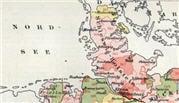Source Information

About Grevesmühlen, Mecklenburg-Western Pomerania, Germany, Marriages, 1876-1920
This is a collection of marriage records from Grevesmühlen and the communities of Börzow, Diedrichshagen, Friedrichshagen, Roggenstorf, and Bössow.
Dating back to the 13th century, Grevesmühlen is one of the oldest towns in Mecklenburg-Vorpommern, lying near the coast of the Baltic Sea in an area surrounded by lakes, woods, and plains. Following the unification of Germany in 1871, civil registration began in 1876 in Mecklenburg.
These records used a standard form and are typically on two pages, so be sure to page forward to capture the entire record. In the header you’ll find
- certificate number
- registration [marriage] place and date
The sections that follow the header are identified by numbers, which apply to the bridge, groom, and witnesses.
1. Groom and 2. Bride, which include:
- occupation and name (Note: You may find that names, whether the bride, groom, or a witness, are preceded by an occupation; e.g., Müller Hans Carl Theodor Ludwig Deigmann is Hans Carl Theodor Ludwig Deigmann the miller.)
- whether groom or bride was known to the registrar (der Persönlichkeit nach bekannt indicates the registrar knew the party), or what documents identified him or her
- religion
- birthdate and place
- residence
- parents’ names (occupations and other details often included) and residence
3. and 4. Witnesses
- names (occupation listed first)
- whether a witness was known to the registrar (der Persönlichkeit nach bekannt), or what documents identified him or her
- age
- residence
Tip: The abbreviation “geb.,” short for “geboren” [born], preceding a name, indicates a birth name. Women with the abbreviation "verw.," for "verwitwet" [widowed], indicates that the following name is the name of her previous husband.
Some marriage and death records are stricken through, which means they are invalid, i.e. the event did not occur. The implication is that a child who had a near death experience might have lived.
Need help with the German language? Find resources in our German Research Center.
 Need help with the German language?
Need help with the German language?